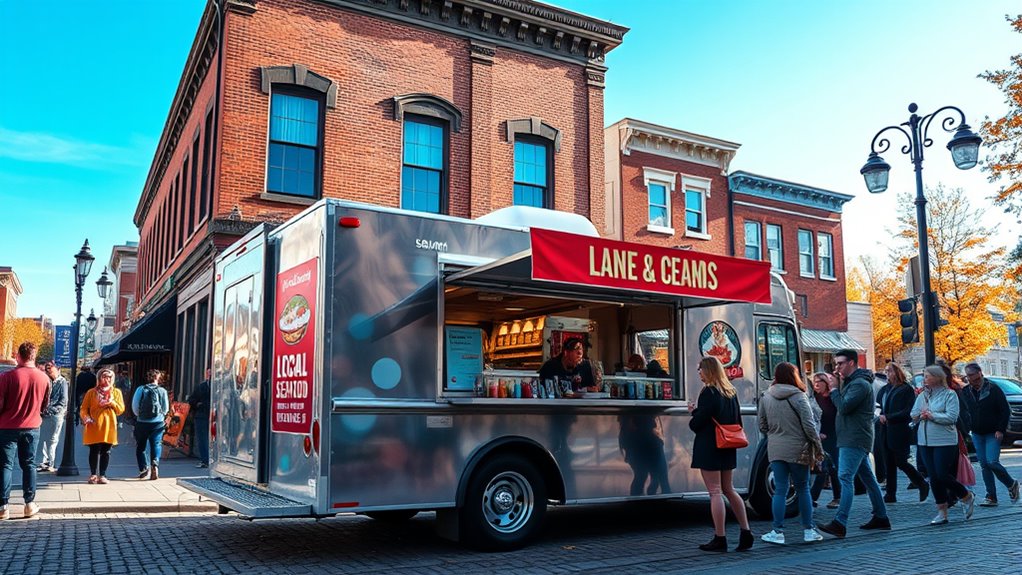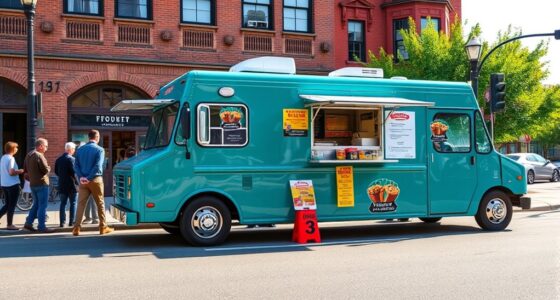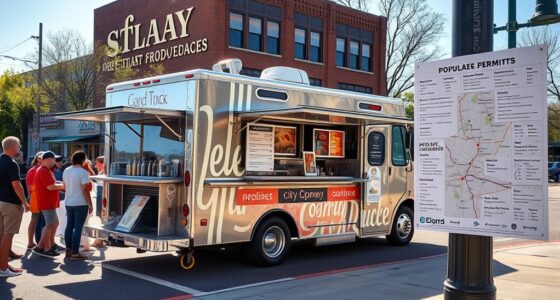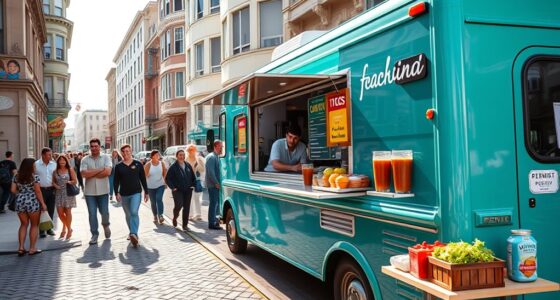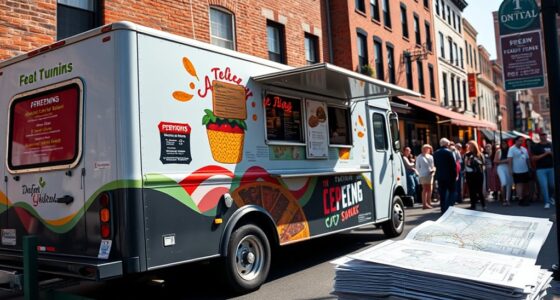To open a food truck in Salem, MA, you need to obtain permits from the Salem Local Board of Health, including a Mobile Food Service permit and possibly a transient vendor permit for events. Budget for truck costs, permits, and ongoing expenses like fuel and supplies. Choose approved locations such as downtown areas or festivals and make certain your menu and equipment meet health standards. For successful marketing, leverage local events and social media. Keep exploring to discover detailed steps and tips for your new venture.
Key Takeaways
- Obtain separate permits from Salem Local Board of Health, including detailed plans and display of the Mobile Food Service permit.
- Budget for truck costs ($35,000–$150,000), permits ($1,864+), and monthly expenses ($5,000–$10,000).
- Secure operating permits for high-traffic areas, parks, and special events, ensuring compliance with location restrictions.
- Submit detailed menu for approval, ensuring all equipment meets Massachusetts standards for refrigeration, sinks, and ventilation.
- Promote your truck through event participation, branding, social media, and local collaborations to maximize visibility and customer loyalty.
Navigating Permit Requirements in Salem
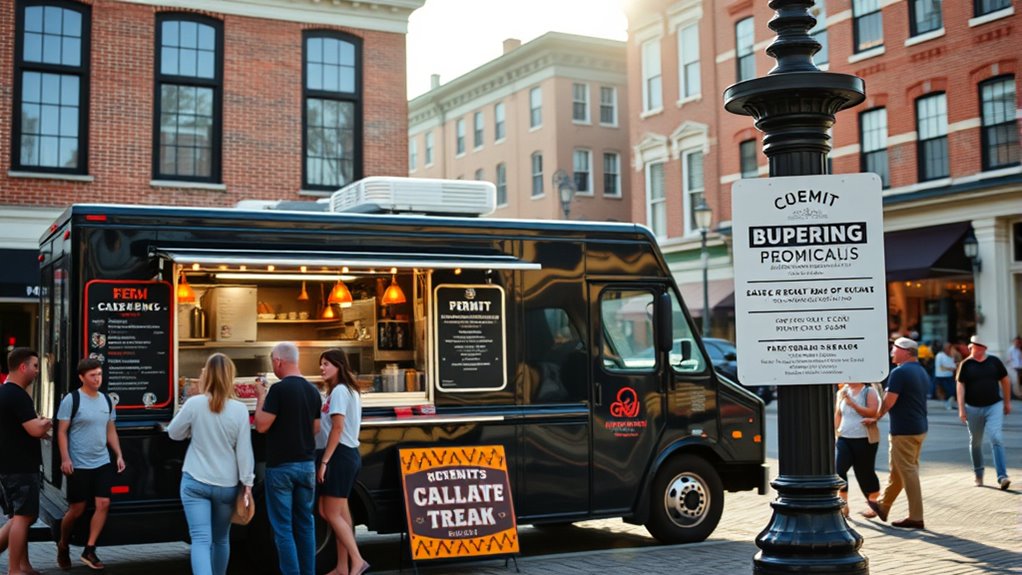
Understanding permit requirements in Salem is straightforward if you understand the specific steps involved. First, you’ll need a separate permit from the Salem Local Board of Health for each mobile food establishment you plan to operate. Your application must include detailed plans, such as your menu, equipment, layout, and expected food volume. The board may impose menu restrictions or specify a servicing area based on your unit’s capabilities. During operation, display your Mobile Food Service permit visibly on your truck or cart. If you’re planning a one-day event, you’ll need a One-Day Transient Vendor Permit, costing $200 per day. Make sure to provide proof of insurance, with the city listed as additional insured, and submit all documents online for quick processing. Additionally, being aware of regulatory compliance requirements can help ensure a smooth approval process.
Understanding Costs and Fees for Your Food Truck
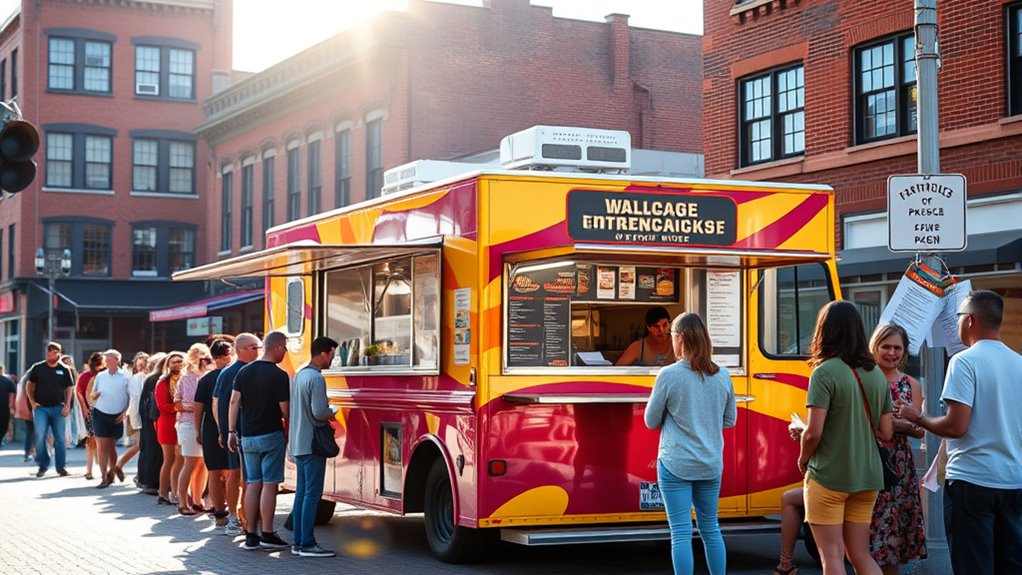
When starting your food truck business in Salem, it’s important to have a clear picture of the costs involved. Initial expenses vary widely, from purchasing a truck ($35,000 to $150,000) to outfitting it with kitchen equipment. Used trucks can reduce costs but may require repairs or upgrades. You’ll also need to budget for permits, licensing, and legal fees, which can range from $1,864 to over $28,000 in Massachusetts. Operating costs, like fuel, supplies, and maintenance, average $5,000 to $10,000 monthly. Marketing expenses for branding, social media, and event sponsorships add up quickly. Additionally, staffing and miscellaneous costs like insurance and waste disposal should be factored into your budget. Understanding local regulations and city-specific fees can help prevent unexpected expenses and ensure compliance with Salem’s licensing requirements. Being aware of home decor considerations for your food truck, such as branding and interior presentation, can also enhance customer experience and attract more patrons.
Locating Approved Operating Areas and Restrictions
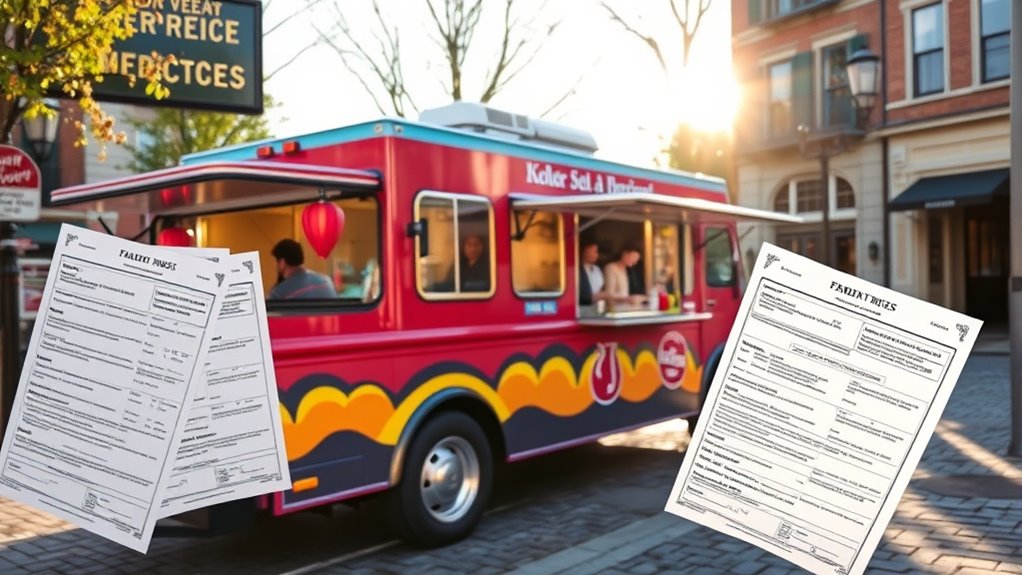
In Salem, locating approved areas for your food truck involves steering through a mix of public street zones, designated vending spots, and public properties that comply with local regulations. You’ll need permits to operate in high-traffic pedestrian areas like downtown or near Salem State University, but these are strictly regulated. Parks and recreational areas often require extra permissions or seasonal restrictions, and special city events may limit truck access unless sponsored or licensed. Your Servicing Area must be inspected and approved by the Local Board of Health, and it can be outside Salem if you provide proof of proper licensing. Time, distance, and proximity restrictions also apply, preventing operation near schools, fire stations, and residential neighborhoods during certain hours to ensure safety and fair competition. The Salem Pantry operates with a focus on providing accessible food resources to diverse community members, highlighting the importance of locating approved areas that do not conflict with existing community services. Additionally, understanding local regulations and zoning laws can help prevent potential violations and fines.
Designing Your Menu and Ensuring Equipment Compliance

Designing your menu and ensuring equipment compliance are essential steps to passing health inspections and operating smoothly. Your menu must be fully detailed and submitted to the Local Board of Health (LBOH) for approval, with all items requiring prior approval. Equipment plans, including layout and types, must meet Massachusetts Retail Food Code standards, featuring refrigeration for TCS foods, separate sinks for handwashing and food prep, and proper ventilation. Keep in mind that menu changes after approval might need re-submission. Additionally, maintaining proper temperature controls**** for TCS foods is crucial to ensure food safety and compliance. – Submit detailed menu and equipment plans for approval – Use compliant refrigeration, sinks, and ventilation systems – Follow strict temperature controls for TCS foods – Maintain accurate records of menu and equipment approvals
Effective Marketing Strategies for Salem’s Food Scene
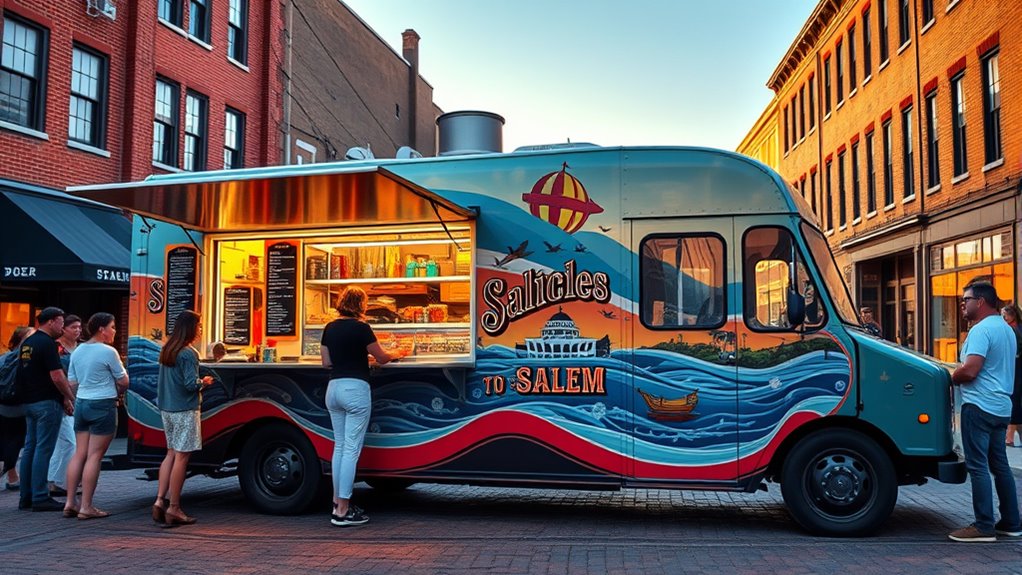
Maximizing your food truck’s visibility in Salem requires strategic marketing efforts that connect with the local community and stand out in a competitive scene. Participating in Salem’s major events like Heritage Days and the Salem Food Truck & Craft Beverage Festival boosts foot traffic and brand recognition. Creating event-specific menu items or promotions tied to local celebrations encourages repeat visits. Sponsoring or collaborating on community events builds goodwill and expands your reach. Use on-site signage, tastings, and interactive experiences to generate word-of-mouth buzz. Developing a strong local brand with vibrant vehicle wraps, logos, and storytelling helps residents and visitors remember you. Maintaining active social media profiles, geo-targeted ads, and influencer partnerships further enhances your presence, driving both visibility and loyalty in Salem’s vibrant food scene. Researching local food trends and incorporating popular ingredients or flavors can help your truck appeal to the tastes of Salem’s diverse customer base. Additionally, understanding nutritional preferences such as plant-based options like chia seeds can attract health-conscious customers and set your menu apart.
Additional Resources and Regulatory Guidance
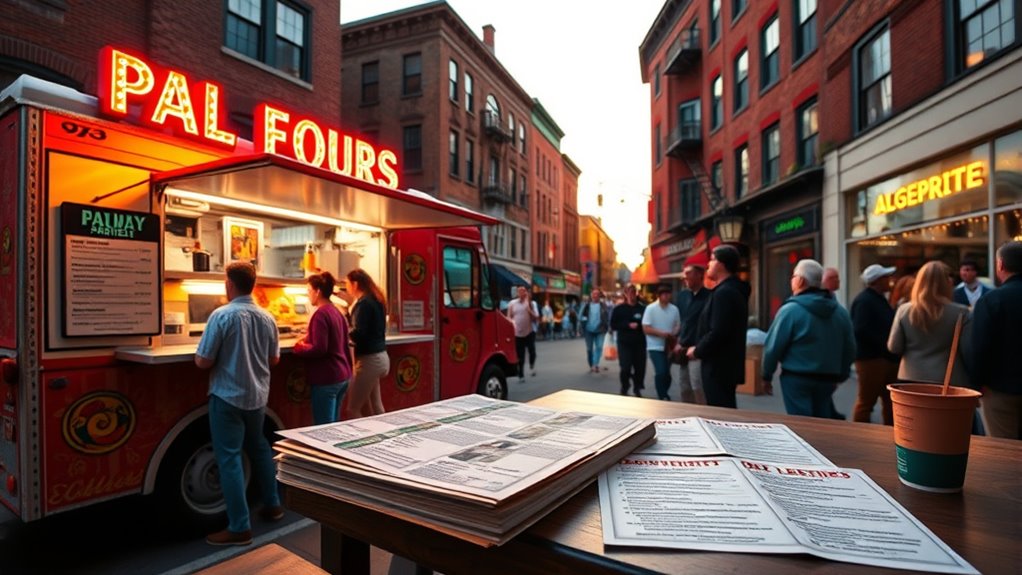
Understanding the regulatory landscape for Salem’s food trucks can seem complex, but knowing the key permits and guidelines is essential for legal operation. You’ll need a Mobile Food Establishment (MFE) permit from Salem’s Board of Health for each truck and location. Your application must include detailed plans of your truck, layout, menu, equipment, and projected food volume. Be aware that permits specify operation dates, locations, and restrictions, with durations set by the LBOH. For special events, like outdoor festivals, you’ll need a separate one-day license from the Salem Licensing Board. Additionally, compliance with the Retail Food Code ensures safe food handling, storage, and cooling. Ensuring compliance with local health regulations is crucial to avoid penalties and ensure the safety of your customers. You should also review food safety training requirements to maintain high standards of hygiene and prevent contamination. – Obtain permits through Salem’s online system – Prepare detailed menu and floor plans – Secure event-specific licenses – Follow health and safety standards
Frequently Asked Questions
How Long Does the Permit Approval Process Typically Take in Salem?
You’re wondering how long it takes to get your permit in Salem. The process varies based on plan completeness and compliance, but generally, it can take several weeks to a few months. Scheduling meetings, addressing upgrades, and passing inspections influence the timeline. Starting early and preparing detailed plans help speed things up. Keep in mind, interdepartmental coordination and potential revisions may extend the process, so patience is key.
Are There Specific Insurance Requirements for Operating a Food Truck in Salem?
You need to meet specific insurance requirements to operate a food truck in Salem. You must carry commercial vehicle insurance, general liability coverage of at least $1 million, and property insurance for your equipment. If you employ staff, workers’ compensation is mandatory. Also, if serving alcohol, liquor liability insurance is necessary. Your insurance must include Salem’s outdoor vending location, name the city and licensing board as insured, and meet Massachusetts regulations.
Can I Operate My Food Truck at Private Events Without a Salem Permit?
Ever pictured serving delicious food at a private event without a permit? In Salem, you can’t operate your food truck at private events without proper permits. Salem requires a Health Department permit, even if the event isn’t open to the public. Operating without one risks fines, shutdowns, and being kicked out. Always coordinate with Salem’s health and fire departments to make certain you’re fully compliant and ready to serve safely.
What Are Salem’S Regulations Regarding Waste Disposal and Sanitation?
You need to follow Salem’s waste disposal and sanitation rules carefully. You must have a designated servicing area for waste and water management, stay within city-approved containers, and recycle properly, including plastics and cardboard. No waste storage is permitted in front yards or within 25 feet of the front line. Regular inspections ensure you meet health standards. Violations can lead to fines or permit revocation, so stay compliant at all times.
Are There Restrictions on Selling Alcohol or Beverages From a Food Truck in Salem?
Like steering Salem’s historic streets, selling alcohol from your food truck involves careful steps. You must obtain specific licenses from the Salem Licensing Board, ensuring compliance with city and state laws. Restrictions apply on where and when you can serve alcohol, often requiring special permits for certain zones or events. Always verify location-specific rules, maintain hygiene standards, and follow responsible serving practices to keep your operation legal and successful.
Conclusion
Starting your food truck journey in Salem is like steering a ship—clear navigation through permits, costs, and locations keeps you afloat. When I first launched my truck, I learned that understanding regulations is your compass, guiding you to success. With the right menu and marketing, you’ll find your groove in Salem’s vibrant food scene. Stay patient and adaptable—your dream of serving delicious food on wheels can become a thriving reality.
